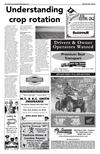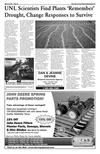18



March 20, 2012 • Page 18
shop online at www.missourivalleyshopper.com
UNL Scientists Find Plants ‘Remember’
Drought, Change Responses to Survive
LINCOLN, Neb. —
Plants subjected to a
previous period of
drought learn to deal with
the stress thanks to their
memories of the previous
experience, University of
Nebraska-Lincoln
research has found. The
findings could lead to
development of crops
better able to withstand
drought.
The research also
confirms, for the first
time, the scientific basis
for what home gardeners
and nursery professionals
have learned, often
through hard experience:
Transplants do better
when water is withheld
for a few days to drought
harden them before the
move.
"This phenomenon of
drought hardening is in
the common literature but
not really in the academic
literature," said Michael
Fromm, a UNL plant
scientist who was part of
the research team. "The
mechanisms involved in
this process seem to be
what we found."
The work is the subject
of an article this week in
the online journal Nature
Communications.
Working with
Arabidopsis, a member of
the mustard family
considered an excellent
model for plant research,
the team of Fromm, plant
molecular biologist Zoya
Avramova and postdoctoral fellow Yong Ding
compared the reaction of
plants that had been
previously stressed by
withholding water to
those not previously
stressed. The pre-stressed
plants bounced back
more quickly the next
time they were
dehydrated. Specifically,
the nontrained plants
wilted faster than trained
plants and their leaves
lost water at a faster rate
than trained plants.
"The plants
'remember' dehydration
stress. It will condition
them to survive future
drought stress and
transplanting," Fromm
said.
The team found that
the trained plants
responded to subsequent
dehydration by
increasing transcription
of a certain subset of
genes. During recovery
periods when water is
available, transcription
of these genes returns to
normal levels, but
following subsequent
drought periods the
plants remember their
transcriptional response
DAN & JEANNE
DEVINE
Y
ANKTON
M
Midwest Insurance Agency
Forget the rest... ride with the best!
OTORSPORTS
4306 W. 8th St. • Yankton, SD • 605.665.3500 • www.yanktonmotorsports.com
• Farm • Crop Hail • Auto
• Business • Home
909 Broadway, Tripp Park Plaza, Yankton, SD
1-605-665-2389
to stress and induce
these genes to higher
levels in this subsequent
drought stress.
"All of this is driven
by events at the
molecular level,"
Avramova said. "We
demonstrate that this
transcriptional memory
is associated with
chromatin changes that
seem to be involved in
maintaining this
memory."
Arabidopsis forgets
this previous stress after
five days of watering,
though other plants may
differ in that memory
time.
This is the first
instance of transcriptional
memory found in any life
form above yeasts.
This discovery may
lead to breeding or
engineering of crops that
would better withstand
drought, although
practical applications of
these findings in
agriculture are years away,
Fromm said.
"We're a long way off.
We're just starting to get a
basic understanding,"
Fromm said. "It's possible
plants overreact to a first
drought stress. They
panic, they slow down
more than they need to."
Perhaps scientists can
modify those instincts in
plants to help maintain or
improve productivity
during times of drought,
he added.
But home gardeners
can make immediate use
of these findings.
"If I was transplanting
something, I would
deprive it of water for a
couple of days, then water
overnight, then
transplant," Fromm said.
This research is funded
by National Science
Foundation, award MCB1121898.




























 Previous Page
Previous Page





